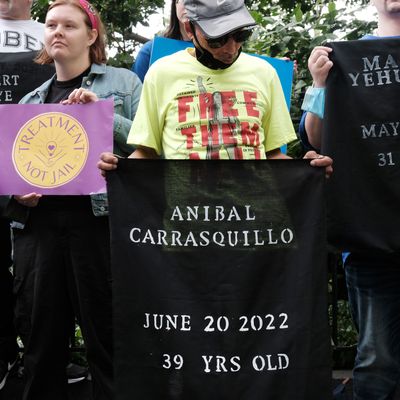
On Friday morning, an inmate in a mental observation unit inside the jail on Rikers Island died, according to The City’s Reuven Blau, becoming the 11th person to die in Department of Correction custody this year. The count so far this year is outpacing last year’s toll of 16 deaths behind bars in the city: At this point in 2021, seven detainees had died.
While deaths have occurred across the city’s detention facilities, Rikers Island is the heart of the problem, long racked by detainee violence, overcrowding, and widespread sick-outs from correction officers. The federal government threatened to take over the jail, but that option was forestalled on June 14 when a federal judge approved a reform plan that includes reducing no-shows by officers, bringing in new leaders, and improving facilities.
Six days later came a striking reminder of the need for reform: Anibal Carrasquillo, 40, reportedly died of a drug overdose, after officers allegedly ignored his complaints of chest pain. He became the sixth person to die at Rikers this year. The next day, Mayor Eric Adams held his first press conference at Rikers as mayor. Standing behind a bulletin board featuring dozens of confiscated shivs, he told the corrections officers: “I am not ashamed of you. I am proud of you. Keep doing the job you are doing.” In April, Adams cited “deliberate disinvestment in the jail complex” and the pandemic as reasons for the deteriorated conditions at Rikers. That day in June, he said that “the era of neglecting the violence and dysfunction of our city’s jails is over.” Adams has said he is committed to closing Rikers by 2027, but has at times expressed opposition to the plan to replace the facility with four smaller jails throughout the city.
That same morning inside Bellevue Hospital’s Prison Ward, 52-year-old Albert Drye died in custody. He was the third such in-custody death in three days, and the eighth person to die in DOC custody. His cause of death has not been made public.
Then there is the continuing policy of using solitary confinement, widely considered a form of torture when used over an extended period of time. July 1 was the deadline to allow detainees in solitary a minimum of ten hours outside their cell per day, but the federal monitor overseeing the jail compound since 2015 advised the city to delay the new rule, because it “poses significant safety concerns.” The policy had already been delayed from its scheduled implementation last November, after correction officers called out sick en masse.
On July 10, Elijah Muhammad, 31, held on Rikers for an assault charge, died in his cell after an apparent drug overdose. By the time his body was found, rigor mortis was already setting in. Days later, a correction officer was fired and the New York Times reports that officials are investigating if the officer failed to render aid to Muhammad. As overdoses rise behind bars throughout the U.S., the Department of Correction issued a directive last month that officers should be trained in how to administer the opioid-reversal drug Narcan. This week, Amanda Masters — the executive director of the Board of Correction, which ensures compliance with the law in city facilities — said that officers had told her they did not know they even had access to the drug that acts as an antidote for opiate overdoses.






























